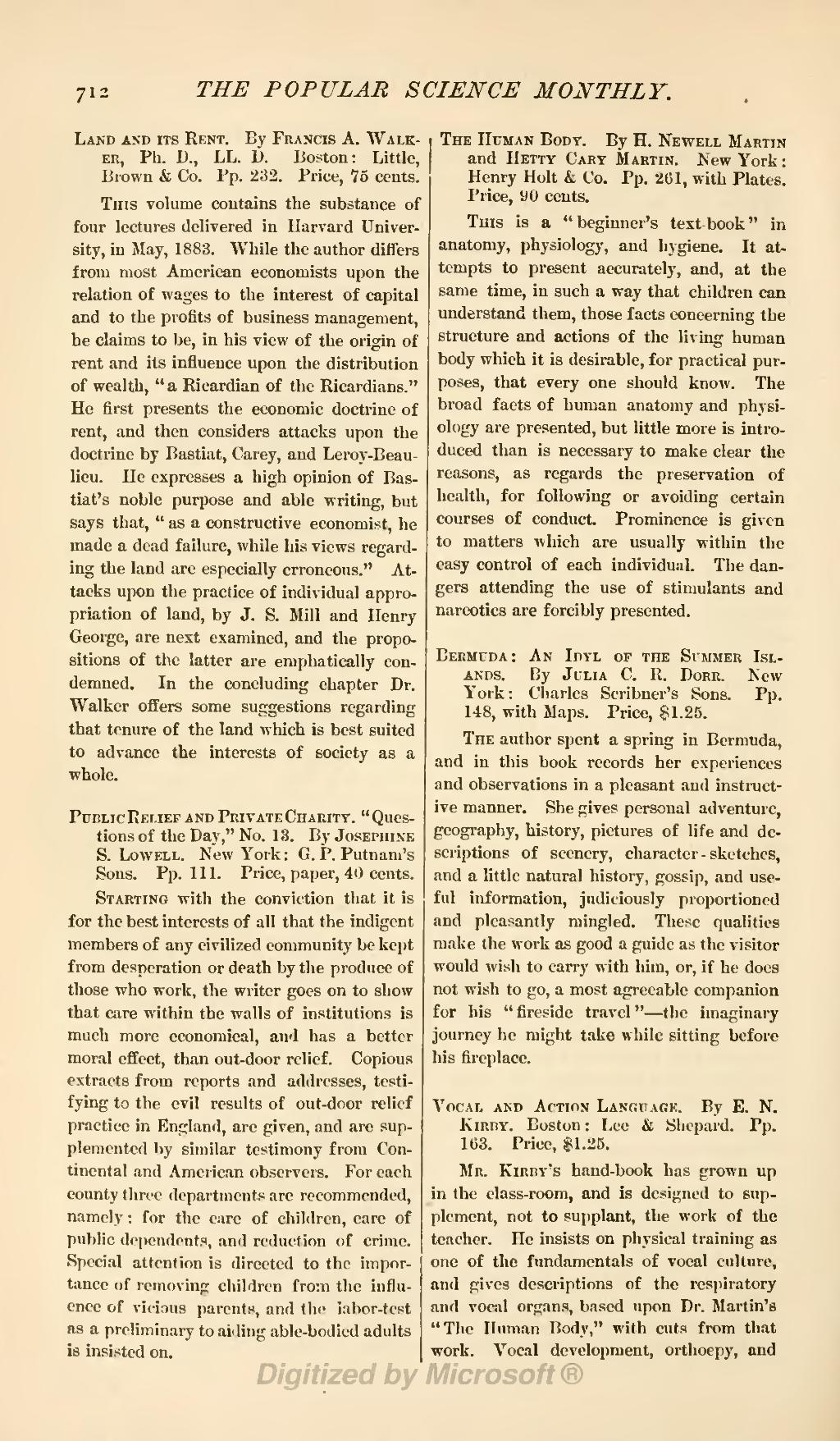Land and its Rent. By Francis A. Walker, Ph. D., LL. D. Boston: Little, Brown & Co. Pp. 232. Price, 75 cents.
This volume contains the substance of four lectures delivered in Harvard University, in May, 1883. While the author differs from most American economists upon the relation of wages to the interest of capital and to the profits of business management, he claims to be, in his view of the origin of rent and its influence upon the distribution of wealth, "a Ricardian of the Ricardians." He first presents the economic doctrine of rent, and then considers attacks upon the doctrine by Bastiat, Carey, and Leroy-Beaulieu. He expresses a high opinion of Bastiat's noble purpose and able writing, but says that, "as a constructive economist, he made a dead failure, while his views regarding the land are especially erroneous." Attacks upon the practice of individual appropriation of land, by J. S. Mill and Henry George, are next examined, and the propositions of the latter are emphatically condemned. In the concluding chapter Dr. Walker offers some suggestions regarding that tenure of the land which is best suited to advance the interests of society as a whole.
Public Relief and Private Charity. "Questions of the Day," No. 13. By Josephine S. Lowell. New York: G. P. Putnam's Sons. Pp. 111. Price, paper, 40 cents.
Starting with the conviction that it is for the best interests of all that the indigent members of any civilized community be kept from desperation or death by the produce of those who work, the writer goes on to show that care within the walls of institutions is much more economical, and has a better moral effect, than out-door relief. Copious extracts from reports and addresses, testifying to the evil results of out-door relief practice in England, are given, and are supplemented by similar testimony from Continental and American observers. For each county three departments are recommended, namely: for the care of children, care of public dependents, and reduction of crime. Special attention is directed to the importance of removing children from the influence of vicious parents, and the labor-test as a preliminary to aiding able-bodied adults is insisted on.
The Human Body. By H. Newell Martin and Hetty Cary Martin. New York: Henry Holt & Co. Pp. 261, with Plates. Price, 90 cents.
This is a "beginner's text-book" in anatomy, physiology, and hygiene. It attempts to present accurately, and, at the same time, in such a way that children can understand them, those facts concerning the structure and actions of the living human body which it is desirable, for practical purposes, that every one should know. The broad facts of human anatomy and physiology are presented, but little more is introduced than is necessary to make clear the reasons, as regards the preservation of health, for following or avoiding certain courses of conduct. Prominence is given to matters which are usually within the easy control of each individual. The dangers attending the use of stimulants and narcotics are forcibly presented.
Bermuda: An Idyl of the Summer Islands. By Julia C. R. Dorr. New York: Charles Scribner's Sons. Pp. 148, with Maps. Price, $1.25.
The author spent a spring in Bermuda, and in this book records her experiences and observations in a pleasant and instructive manner. She gives personal adventure, geography, history, pictures of life and descriptions of scenery, character-sketches, and a little natural history, gossip, and useful information, judiciously proportioned and pleasantly mingled. These qualities make the work as good a guide as the visitor would wish to carry with him, or, if he does not wish to go, a most agreeable companion for his "fireside travel"—the imaginary journey he might take while sitting before his fireplace.
Vocal and Action Language. By E. N. Kirby. Boston: Lee & Shepard. Pp. 163. Price, $1.25.
Mr. Kirby's hand-book has grown up in the class-room, and is designed to supplement, not to supplant, the work of the teacher. He insists on physical training as one of the fundamentals of vocal culture, and gives descriptions of the respiratory and vocal organs, based upon Dr. Martin's "The Human Body," with cuts from that work. Vocal development, orthoepy, and

